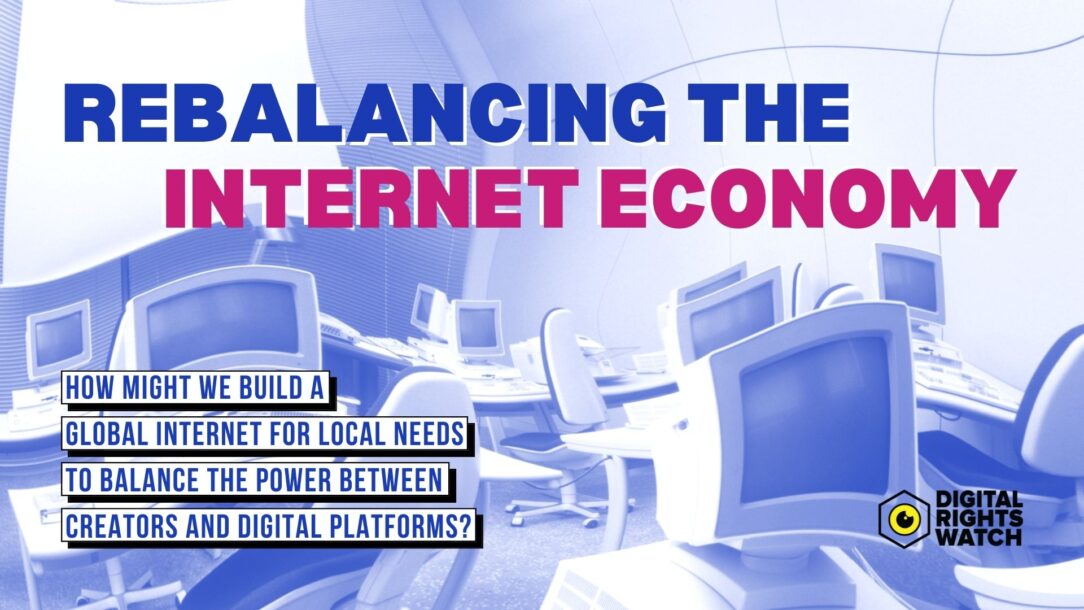The growing power of big tech platforms in the internet economy is hurting local industries and harming communities according to a new report from Digital Rights Watch.
The Rebalancing The Internet Economy report investigated the impact that global digital platforms are having on local creative workers and industries.
The report found that the growing hold that for-profit digital platforms have over audiences is making life harder for creative workers and threatening the unique cultural lives of communities across Australia.
Musicians, artists, writers and other creative workers are under increasing stress as digital platforms lock-in audiences and force artists to accept revenue models that underpay creators.
The report recommends that the government play a more active role both in regulating the internet economy, supporting creative workers and fostering local and public owned alternatives to big-tech.
The report calls for the Australian government to mandate that digital platforms provide transparency in regard to royalties, licensing, as well as how the algorithms that drive their platforms work while tackling anti-competitive practices that lock-in users and creators.
There are growing calls for the Australian government to play a much more active role in the internet economy to provide alternatives to multi-national digital platforms and directly support creative workers who contribute so much to our cultural lives.
Quotes attributable to Eilish Gilligan, Singer-Songwriter
“Digital platforms, including social media, get so much value from the contributions of artists and creators—it’s what makes them vibrant and interesting. And while the platforms are making billions in profit off the backs of creative workers, the artists themselves are left without a liveable wage. This is made worse by the ongoing challenges and risks of doing live gigs at the moment, which is where artists often make the majority of their income.”
“Over the lockdowns of Covid-19, I lost gigs, income and community. The ability to use digital platforms to share work, livestream performances, and build an online community created opportunities for me and other artists over the Coronavirus pandemic. But the level of time and commitment it takes to constantly churn out content online paired with the very small revenue share artists get makes it completely unsustainable on its own.”
“There is a huge amount of pressure as an artist to be very active and vulnerable on social media, and to share your work for free, in the hope that it will translate into people listening to and paying for your music. But in reality, having a lot of followers doesn’t necessarily translate to actual fans or supporters, or a liveable income as an artist. Between pressure from labels and the design of social media platforms, it creates a kind of gambler’s mindset that pushes artists to keep creating content for free in the hope that it will go viral online.”
Quotes attributable to James Clark, Executive Director, Digital Rights Watch
“Without creative workers producing content and building communities on digital platforms, these platforms would be nothing. But these workers and the communities they serve are being left behind by big tech monopolies.”
“Creative work is vital for building and maintaining communities. The increasing concentration of power in these industries isn’t just making life harder for creative workers, it is weakening our communities and making our cultural lives less vibrant and inclusive.”
“To rebalance the internet economy in favour of local communities, we need the government to play a much larger role. We must look at ways to regulate the internet economy that prevents and undoes the consolidation of power in the hands of a few big-tech and media companies.”
Quotes attributable to Sam Floreani, Program Lead, Digital Rights Watch
“We need an approach to internet regulation that values communities and protects their safety, but the current approach to Online Safety isn’t striking the right balance. At the moment, regulation pushes for broad, top-down censorship instead of giving communities the tools and autonomy they need to stay safe.”
“Regulation that focuses on content removal and censorship does more harm than good. We need to be empowering local communities to have more control over online spaces and the internet economy.”
“Global platforms are imposing a homogenous set of moral standards to communities across the globe. These external imposed standards are harming already over-policed and censored communities that are using the digital economy to make our cultural lives more vibrant and inclusive.”
Media contact:
James Clark, Executive Director 0400 022 203 or media@digitalrightswatch.org.au

